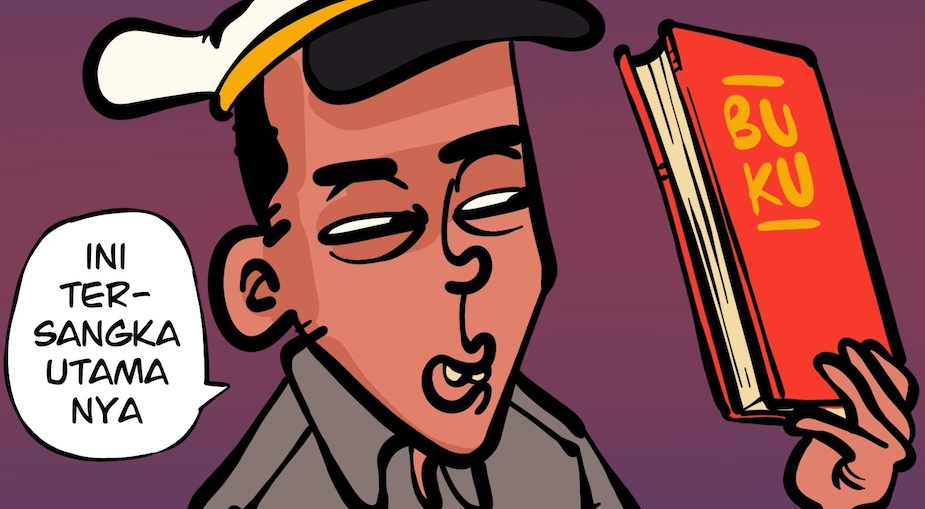The mysteries of koro puzzle doctors, but dukun come to the rescue
David Mitchell
Modern psychiatric texts list koro as the name of a condition in which the patient believes his penis is shrinking and that when it disappears he will die. The first cases were described in Indonesia between 1895 and 1935 but no new reports have appeared since then. If we relied on the Indonesian newspapers and medical journals we would think that the shrinking penis disease has disappeared. A trip to a dukun proves otherwise.
Shrinking penis detective
Koro’ is a Makassarese and Buginese word meaning wrinkled or shrunk (kerut in Indonesian). The word was adopted as a euphemism by the colonial doctors who first documented it. Today, however, even native speakers of those languages do not know what it refers to. It is necessary to specify koro’ laso (shrunken penis) so that people will understand what is intended.
Once you know the correct terminology, it is still possible to find cases of the shrinking penis disease in several places in Indonesia. It occurs in South Sulawesi and in Flores, where it is known in the Ende language as mbaze. On the island of Sumba it is known as hidu tama (‘going inside’ disease) or hei lulu (‘everything pulled up’). In Chinese communities it is known as suo yang in Mandarin, or suk yeong in Cantonese.
Traditional remedies
I recently paid a visit to Hina Panjarra, a traditional healer or dukun, who has a successful penis-rescue practice on the outskirts of Waingapu in East Sumba. His patients come from all walks of life, and either send a car to pick him up or arrive with great urgency at his house. It is always an emergency and patients present in a panicky state the shrunken penis either tied with a string, or grasped firmly by the patient or one of his friends, so as to prevent it from disappearing into the body, and thus causing his death.
Hina stocks a special massage oil prepared from roots and barks he collects from the forest according to a recipe passed down from his ancestors. He vigorously rubs the oil into the legs and the abdomen of his patient, takes a swig of the oil himself to show that it is innocuous, and gives him a small bottle to take home. His treatment is always effective and the penis returns to its normal state within 15 minutes to half an hour. If the condition occurs again the patient may apply the oil themselves directly to the afflicted part. The dukun himself avoids massaging the penis but the patient is encouraged to do so.
Hina’s customers
The oil is not a general tonic, Hina explains, and should not be used for ordinary fevers and sicknesses, but it is quite good as a kebal (immunity) medicine to strengthen the body against blows and bullets. A number of the local hoods and policemen can be found among Hina’s customers. Although it is basically a massage oil, small amounts can be taken orally as well. It also contains a clove of garlic and other kitchen herbs which make it more palatable. When the oil runs low ordinary coconut oil may be added and the bottle put aside for the ingredients to leach into the oil. Customers may also drop by and pick up a new bottle any time. Hina accepts whatever the customer chooses to pay. Like many traditional healers, he presents himself as a simple man and claims no credit for himself. He cannot explain either the cause of the illness or how the medicine works. Any potency the oil may have is due to the gods, he says.
The koro puzzle continues
While medical opinion is that the penis does not shrink and koro is a psychiatric disorder, traditional healers like Hina Panjarra report that they find the penis in a shrunken condition and restore it to normal. Villagers have observed that the penises of men who collapse and die suddenly are often found on closer examination to be in a shrunken state. ‘Definitely smaller than normal’, they say. Not surprisingly patients who fear this might be happening to them prefer to go directly to the dukun with the potent time-honoured cure rather than waste time with the sceptical doctor — who usually has fixed hours of practice and a crowded waiting room.
The two healing traditions are at cross-purposes here. While doctors are still puzzling about this strange condition, dukun continue to administer vital first aid. The explanation for the condition, whether it be physiological or psychological, is not important for the patient. For him, only the cure matters.
David Mitchell is a medical academic at Monash University. He can be contacted at david.mitchell@med.monash.edu.au











